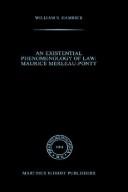| Listing 1 - 4 of 4 |
Sort by
|
Multi
ISSN: 00791350 22150331 ISBN: 9781402087981 9781402091780 9781402087974 9781402091773 1402087977 140209177X Volume: 189-190 Publisher: The Hague
Abstract | Keywords | Export | Availability | Bookmark
 Loading...
Loading...Choose an application
- Reference Manager
- EndNote
- RefWorks (Direct export to RefWorks)
Scope: Phaenomenologica is the longest running phenomenological book series world-wide. It was originally founded as a companion series to the Husserliana, and its first volume appeared in 1958. To this day, the series publishes studies of Husserl's work and of the work of related thinkers, investigations into the history of phenomenology, in-depth studies of specific aspects of phenomenology and phenomenological philosophy, and independent phenomenological research by scholars from all over the world. This unique series now unites several generations of phenomenologists, including Emmanuel Levinas, Jan Patočka, Eugen Fink, Roman Ingarden, Alfred Schutz, Bernhard Waldenfels and Marc Richir. --Springer
filosofie
---
Metaphysics
---
persoonlijkheidsleer
---
metafysica
---
existentialisme
---
godsdienstfilosofie
---
Psychology
---
metaphysics
---
Philosophy
---
Religious studies
---
Existential phenomenology.
---
Transcendentalism.
---
Phénoménologie existentielle
---
Transcendantalisme
---
EPUB-LIV-FT LIVHUMAI SPRINGER-B
---
Theory of knowledge
---
Academic collection
---
#BIBC:boekadm

ISBN: 0792301250 9780792301257 Year: 1989 Volume: 113 Publisher: Dordrecht Kluwer
Abstract | Keywords | Export | Availability | Bookmark
 Loading...
Loading...Choose an application
- Reference Manager
- EndNote
- RefWorks (Direct export to RefWorks)
Philosophical anthropology --- Psychiatry --- Existential phenomenology --- Existentiële fenomenologie --- Philosophie phénoménologique --- Phénoménologie existentielle --- Phénoménologie transcendantale --- Psychiatrie --- Philosophy --- Philosophie --- Existential phenomenology. --- Philosophy. --- -Academic collection --- Medicine and psychology --- Mental health --- Psychology, Pathological --- Existentialism --- Phenomenology --- Philosophy, Modern --- Phénoménologie existentielle --- Academic collection --- Phénoménologie --- Psychiatry - Philosophy.

ISBN: 9024735203 9048183022 9401707073 9789024735204 Year: 1987 Volume: 104 Publisher: Dordrecht Nijhoff
Abstract | Keywords | Export | Availability | Bookmark
 Loading...
Loading...Choose an application
- Reference Manager
- EndNote
- RefWorks (Direct export to RefWorks)
The following pages attempt to develop the main outlines of an existential phenomenology of law within the context of Maurice Merleau-Ponty's phe nomenology of the social world. In so doing, the essay addresses the rather narrow scholarly question, If Merleau-Ponty had written a phenomenology of law, what would it have looked like? But this scholarly enterprise, although impeccable in itself, is also transcended by a more complicated concern for a very different sort of question. Namely, if Merleau-Ponty's phenomenological descriptions of the social world are correct-as I believe they largely are-then what are the philosophical consequences for an adequate understanding of law? Such a project may well occasion a certain surprise amongst observers of the contemporary philosophical landscape, at least in what concerns the terrain of continental thought, and for two different reasons. The first is that, although interest in Merleau-Ponty's work remains strong in the· United States and Can ada, his philosophical standing in his own country has been largely eclipsed! by that of, first, his friend/estranged acquaintance, Jean-Paul Sartre; by various Marxist philosophies and critical social theories; and finally by those doing her meneutics of language. In my view, current neglect of Merleau-Ponty's thought in France is most regrettable.
Legal theory and methods. Philosophy of law --- Merleau-Ponty, Maurice --- Law --- Existential phenomenology --- Droit --- Phénoménologie existentielle --- Philosophy --- Philosophie --- Merleau-Ponty, Maurice, --- 340.16 --- Academic collection --- Existentialism --- Phenomenology --- Philosophy, Modern --- Juridische logica. Juridische software --- -Merleau-Ponty, Maurice --- Existential phenomenology. --- Philosophy. --- 340.16 Juridische logica. Juridische software --- Phénoménologie existentielle --- Jurisprudence --- Merleau-Ponty (Maurice) / et Lois. --- Merleau-Ponty (Maurice) / en Wetten. --- Law - Philosophy --- Merleau-Ponty, Maurice, - 1908-1961 --- Merleau-Ponty, Jean Jacques Maurice, --- Merlō-Ponty, Mōris, --- Ponty, Jean Jacques Maurice Merleau-, --- Ponty, Maurice Merleau-, --- מרלו־פונטי, מוריס, --- Merleau-ponty (maurice), philosophe francais, 1908-1961 --- Philosophie moderne --- Critique et interpretation --- 20e siecle
Book
ISBN: 287060078X 9782870600788 Year: 2000 Volume: 40 Publisher: Bruxelles Ousia
Abstract | Keywords | Export | Availability | Bookmark
 Loading...
Loading...Choose an application
- Reference Manager
- EndNote
- RefWorks (Direct export to RefWorks)
Fenomenologie --- Phénoménologie --- Sartre, Jean-Paul --- Existential phenomenology --- Self (Philosophy) --- Philosophy, Modern --- Phénoménologie existentielle --- Moi (Philosophie) --- Philosophie --- Sartre, Jean-Paul, --- Phenomenology --- Sartre, Jean Paul --- Phenomenology. --- Phénoménologie existentielle --- Sartŭr, Zhan-Pol --- Sartr, Zhan-Polʹ --- Sārtar, Jān-Būl --- Sārtar, Zhān-Pūl --- Sha-tʻe --- Sartre, J.-P. --- Sa-tʻe --- Sate --- Sa-tʻe, Jang-Pao-erh --- Sate, Rangbao'er --- Sāt, Chō̜ng-Pō̜n --- Sarutoru --- Sarṭr, G'on Pol --- Chō̜ng-Pō̜n Sāt --- Cārttar, L̲ān̲-Pōl --- Сартp, Жан-Поль, --- סארטר, ג׳אן פול --- סארטר, ג׳אן פון --- סארטר, ז׳אן פול --- סארטר, ז׳אן־פול, --- سارتر، جان پول --- Guillemin, Jacques --- Sārtra, Jyām̐ Pāla --- サルトル, ジャン ポール --- Sartre, Jean-Paul, 1905-1980
| Listing 1 - 4 of 4 |
Sort by
|

 Search
Search Feedback
Feedback About UniCat
About UniCat  Help
Help News
News